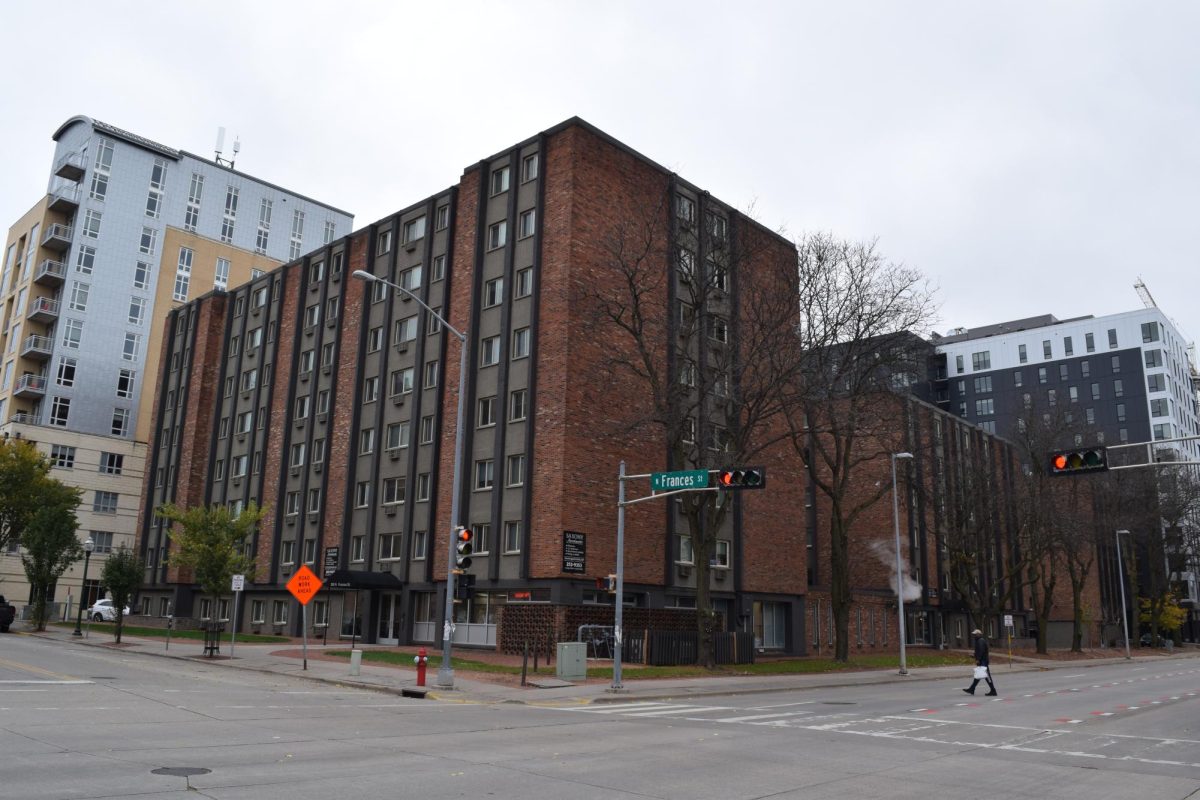Saxony Apartments, located at 305 N. Frances St., is potentially being redeveloped by Core Spaces, the same company that built The James, The Hub and oLiv, according to the Wisconsin State Journal. Core Spaces is also working on two additional downtown apartment communities that have already been approved by the city, the 12-story, 235-unit “Johnson & Bassett” project on West Johnson and North Bassett streets and the 15-story, 474-unit “Johnson & Broom” project on West Johnson and North Broom streets.
Core Spaces defines itself as a vertically integrated ecosystem focused on building, buying and managing student housing and build-to-rent communities, according to the Core Spaces website.
Core Spaces submitted initial plans for the 305 N. Frances St. project to Madison’s Development Assistance Team earlier this year and will propose a formal application for City Council approval soon, according to the Wisconsin State Journal.
This new development would replace the existing Saxony Apartments, a student housing complex originally constructed in 1966 consisting of multiple buildings spanning between one to eight stories high.
University of Wisconsin senior and Saxony Apartments resident since August 2023 Ava Lindstrom expressed her initial confusion about the redevelopment of Saxony into a luxury apartment, noting the building is older but generally functional and one of few affordable options available.
“It made me think about what I would have done if [living in Saxony] wasn’t available to me, because there’s no way I could afford the James or oLiv or any of those luxury apartments,” Lindstrom said. “It makes me feel bad for those lower classmen that might not have the same opportunities as others.”
The residents of Saxony were alerted via email Sept. 30, 2024, that they will not have the option to renew their lease for the following year.
Lindstrom spoke to the ability to find secure housing with this late nonrenewal alert, speaking negatively about the prospect.
“With how crazy it is on this campus specifically, there would be no time,” Lindstrom said. “Basically your only option to find affordable housing is going out further from campus or living in a house, which some people don’t want to do.”
Finding affordable housing close to campus has only gotten increasingly more difficult in the past years and students commonly turn to renewing their leases to avoid the complicated housing market, Lindstrom said.
Lindstrom discussed her perspective on the motivation behind the redevelopment of Saxony Apartments, claiming the property managers are doing it for profit purposes only.
“I want them to listen to the people that live there and know their audience,” Lindstrom said. “I feel like a lot of the property managers know what they’re doing when they do this and they’re just selling out.”
Assistant Professor in the Department of Planning and Landscape Architecture Revel Sims spoke to the broader housing crisis in Madison, adding that there is a general housing crisis across the country as well.
Low vacancy rates and high demand for housing create a complicated environment for the housing market, but Madison is making efforts to create more affordable housing, Sims said.
“The city has been encouraging subsidized affordable housing and has done a lot toward that compared to some other cities,” Sims said. “But like other growing cities, Madison is struggling with applying affordable housing and that’s because most of the new housing that’s coming on board is at the upper end of the market.”
UW Professor of Urban Planning and expert in affordable housing Kurt Paulsen spoke about how downtown Madison is a hotspot for the housing market.
For the last 15 years, Madison has seen immense job and income growth and high-income regions tend to have more expensive housing, Paulsen said. Additionally, the Madison job market and population are growing faster than the rate at which housing units are created, putting stress on the housing market and resulting in higher rates.
Paulsen claims the housing market is struggling in Madison due to the high demand to live in the city and gives three reasons for this demand.
“Number one is there are 50,000 jobs downtown and people like to live near jobs, particularly lower-wage workers need to live closer to jobs because transportation is expensive,” Paulsen said. “The second is that downtown has a high amenity and quality of life. Museums, restaurants, bars, the lake, the university, all desirable places to live.”
The third reason Paulsen gave was the increase in student population, with this year’s enrollment being the second-largest freshman class in history, according to UW News.
Furthermore, two unique factors affect the housing market in Madison — the lakes and the Capitol height limits, Paulsen said.
“It’s a classic urban planning problem of too much demand and too little space,” Paulsen said.
The redevelopment of Saxony Apartments exacerbates this problem, contributing to a direct loss of affordable units and contributing more higher-end housing to an already tight housing market, Sims said.
Paulsen discussed the trade-off between price and quality that many students wrestle with when it comes to housing. The price of a unit typically is a direct reflection of quality and newer buildings are always going to be more expensive to live in because not only do they have a higher quality, but the cost of construction is also high.
“So this is the great trade-off between price and quality,” Paulsen said. “What you saw in the Student Affordable Housing Survey is students really wrestling with that trade-off because they don’t want to spend too much money, but they also don’t want to live in a low-quality building or a location that’s too far away from campus.”
When it comes to the Saxony Apartments residents being able to find other housing in the timeline they were given, Sims was concerned.
Additionally, the affordability of Saxony Apartments is a factor. Students who can’t afford to live in the new buildings being constructed will inevitably face difficulty finding another affordable housing option upon the closing of Saxony Apartments, Sims said.
“I can imagine if students are in this environment realizing that they now have to find another place to live in the future, it’s just a very competitive environment for tenants and I think that that would add an incredible amount of insecurity and stress on tenants,” Sims said.
But, no Wisconsin law requires a landlord to renew a lease. One cannot change the terms mid-lease, but there is no requirement for renewal, which differentiates Wisconsin from other states, Paulsen said.
Additionally, Paulsen spoke to the potential inability to create new housing without disrupting old housing.
“The only way to perhaps do this without displacing any housing would be to look for vacant commercial space or parking lots to build more housing,” Paulsen said. “But if you’ve looked around, there’s just not much land that’s available for redeveloping without knocking down existing housing.”
To alleviate stress on Saxony Apartments residents, approximately 200 of the proposed new complex’s 1,330 beds will be offered at a 40% discount from the market rate, according to The Wisconsin Journal.



